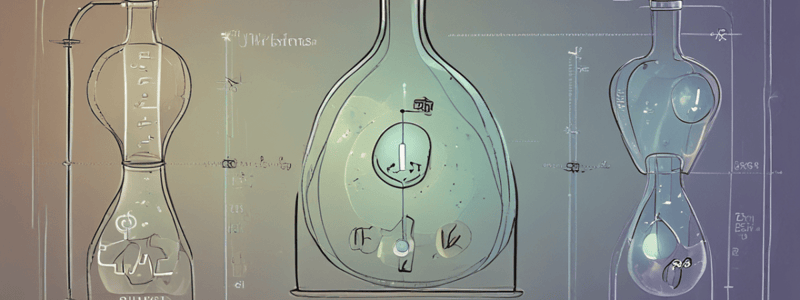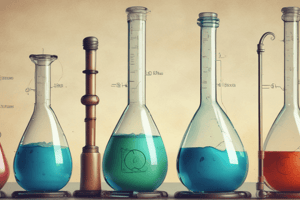Podcast
Questions and Answers
What is the SI unit for pressure?
What is the SI unit for pressure?
- Millimeters of mercury
- Pascals (correct)
- Kelvin
- Atmospheres
What is the relationship between pressure and volume of an enclosed gas at a constant temperature?
What is the relationship between pressure and volume of an enclosed gas at a constant temperature?
- Not related
- Inversely proportional (correct)
- Directly proportional
- Equal
What is the universal gas constant R in J·K⁻¹·mol⁻¹ equivalent to?
What is the universal gas constant R in J·K⁻¹·mol⁻¹ equivalent to?
- Pressure per mole per Kelvin
- Force per mole per Kelvin
- Energy per mole per Kelvin (correct)
- Energy per kilogram per Kelvin
What is the effect of increasing the temperature of a gas at constant pressure?
What is the effect of increasing the temperature of a gas at constant pressure?
What is the relationship between the initial and final states of an ideal gas?
What is the relationship between the initial and final states of an ideal gas?
What is the unit of temperature in the ideal gas laws?
What is the unit of temperature in the ideal gas laws?
If the volume of a gas is doubled at constant temperature, what happens to the pressure?
If the volume of a gas is doubled at constant temperature, what happens to the pressure?
What is the conversion from Celsius to Kelvin?
What is the conversion from Celsius to Kelvin?
What is the relationship between the pressure and temperature of a gas when the volume is kept constant?
What is the relationship between the pressure and temperature of a gas when the volume is kept constant?
What is the formula that relates the initial and final states of a gas, assuming the volume remains constant?
What is the formula that relates the initial and final states of a gas, assuming the volume remains constant?
What is the purpose of the general gas equation?
What is the purpose of the general gas equation?
What is the unit of the universal gas constant R?
What is the unit of the universal gas constant R?
What is the condition for applying the ideal gas equation?
What is the condition for applying the ideal gas equation?
What is the relationship between the number of moles of gas and the volume of the gas, according to Avogadro's Law?
What is the relationship between the number of moles of gas and the volume of the gas, according to Avogadro's Law?
What is the purpose of understanding the gas laws and equations?
What is the purpose of understanding the gas laws and equations?
What is the formula that combines Boyle's Law and the pressure-temperature relationship?
What is the formula that combines Boyle's Law and the pressure-temperature relationship?
What is the unit of volume in the ideal gas laws?
What is the unit of volume in the ideal gas laws?
What is the effect of decreasing the volume of a gas at constant temperature?
What is the effect of decreasing the volume of a gas at constant temperature?
What is the relationship between the volume of a gas and its temperature, according to Charles' Law?
What is the relationship between the volume of a gas and its temperature, according to Charles' Law?
What is the conversion from mm Hg to Pa?
What is the conversion from mm Hg to Pa?
What is the relationship between the pressure and volume of an enclosed gas at constant temperature, according to Boyle's Law?
What is the relationship between the pressure and volume of an enclosed gas at constant temperature, according to Boyle's Law?
What is the unit of moles in the ideal gas laws?
What is the unit of moles in the ideal gas laws?
What is the effect of increasing the temperature of a gas at constant pressure, according to Charles' Law?
What is the effect of increasing the temperature of a gas at constant pressure, according to Charles' Law?
What is the relationship between the initial and final states of an enclosed gas, according to Boyle's Law?
What is the relationship between the initial and final states of an enclosed gas, according to Boyle's Law?
What is the relationship between the volume and temperature of a gas when the pressure is kept constant?
What is the relationship between the volume and temperature of a gas when the pressure is kept constant?
What happens to the pressure of a gas when its temperature is increased, assuming the volume remains constant?
What happens to the pressure of a gas when its temperature is increased, assuming the volume remains constant?
What is the purpose of the general gas equation?
What is the purpose of the general gas equation?
What is the ideal gas equation?
What is the ideal gas equation?
What is the implication of the general gas equation?
What is the implication of the general gas equation?
What is the significance of Avogadro's Law?
What is the significance of Avogadro's Law?
What is the condition for applying the ideal gas equation?
What is the condition for applying the ideal gas equation?
What is the significance of understanding gas laws and equations?
What is the significance of understanding gas laws and equations?
If the volume of a gas is halved at constant temperature, what happens to the pressure?
If the volume of a gas is halved at constant temperature, what happens to the pressure?
Which of the following is a direct result of the ideal gas equation?
Which of the following is a direct result of the ideal gas equation?
What is the primary purpose of the general gas equation?
What is the primary purpose of the general gas equation?
If the temperature of a gas is increased at constant pressure, what happens to its volume?
If the temperature of a gas is increased at constant pressure, what happens to its volume?
What is the primary assumption underlying the ideal gas equation?
What is the primary assumption underlying the ideal gas equation?
Which of the following is a consequence of the pressure-temperature relationship?
Which of the following is a consequence of the pressure-temperature relationship?
What is the significance of the constant k in the general gas equation?
What is the significance of the constant k in the general gas equation?
What is the primary advantage of using the ideal gas equation?
What is the primary advantage of using the ideal gas equation?
If the volume of an enclosed gas is tripled at a constant temperature, what happens to the pressure?
If the volume of an enclosed gas is tripled at a constant temperature, what happens to the pressure?
A gas is heated at a constant pressure, causing its volume to increase from 2 L to 4 L. What is the ratio of the final temperature to the initial temperature?
A gas is heated at a constant pressure, causing its volume to increase from 2 L to 4 L. What is the ratio of the final temperature to the initial temperature?
If the pressure of an enclosed gas is quadrupled at a constant temperature, what happens to the volume?
If the pressure of an enclosed gas is quadrupled at a constant temperature, what happens to the volume?
A gas is cooled at a constant pressure, causing its volume to decrease from 4 L to 2 L. What is the ratio of the final temperature to the initial temperature?
A gas is cooled at a constant pressure, causing its volume to decrease from 4 L to 2 L. What is the ratio of the final temperature to the initial temperature?
What is the relationship between the initial and final states of an enclosed gas if the pressure is doubled and the volume is halved?
What is the relationship between the initial and final states of an enclosed gas if the pressure is doubled and the volume is halved?
If the temperature of an enclosed gas is increased from 200 K to 400 K at a constant pressure, what happens to the volume?
If the temperature of an enclosed gas is increased from 200 K to 400 K at a constant pressure, what happens to the volume?
What is the relationship between the initial and final states of an enclosed gas if the volume is doubled and the pressure is halved?
What is the relationship between the initial and final states of an enclosed gas if the volume is doubled and the pressure is halved?
If the pressure of an enclosed gas is decreased by a factor of 2 at a constant temperature, what happens to the volume?
If the pressure of an enclosed gas is decreased by a factor of 2 at a constant temperature, what happens to the volume?




